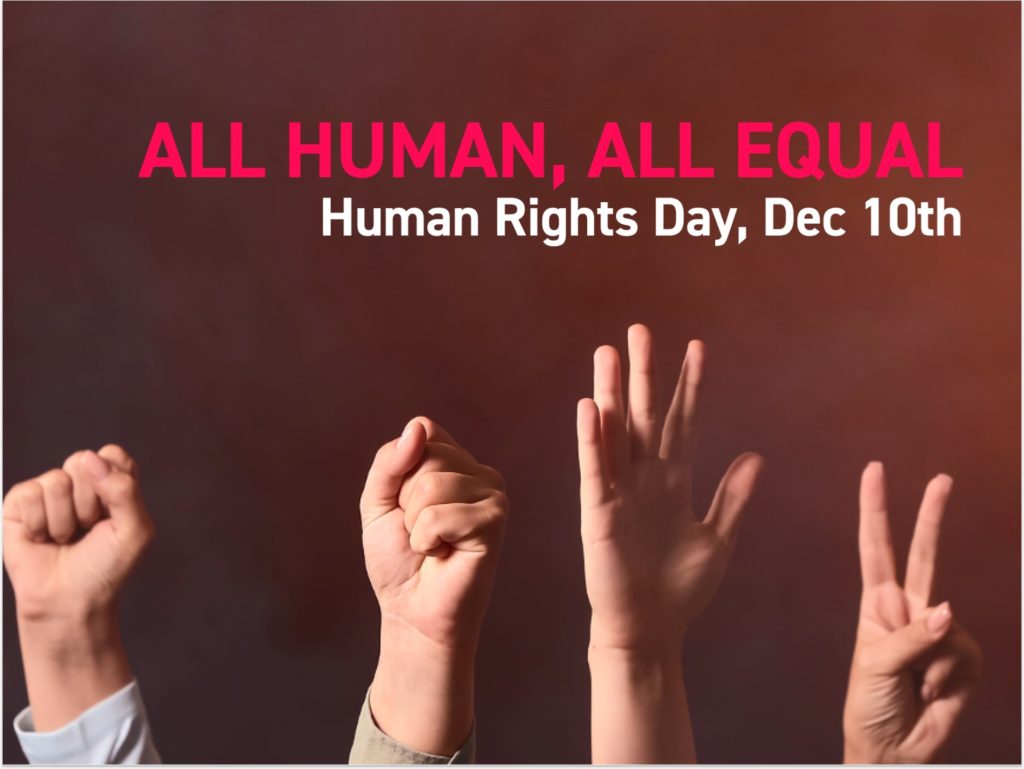ALL HUMAN, ALL EQUAL
EQUALITY IN DIGNITY AND RIGHTS FOR ALL, BOTH IN OPPORTUNITIES AND OUTCOMES, FOR A FAIRER AND MORE INCLUSIVE SOCIETY

December 2021
Where, after all, do universal human rights begin?
This was the question that started a statement Eleanor Roosevelt made on the occasion of the Human Rights Day, that every year on December 10th is observed.
This day back in 1948, the General Assembly of the United Nations adopted the Universal Declaration of Human Rights. This document is also known as the most translated document in the world, and it is a milestone, it proclaims the inalienable rights that everyone has, as a human being.
The Declaration consists of a preamble and 30 articles that set out a broad range of fundamental human rights and freedoms to which all of us, everywhere around the world, are entitled to. It guarantees our rights without distinction of nationality, place of residence, gender, national or ethnic origin, religion, language, or any other status.
Each year a theme is chosen in order to draw attention to a facet of the effort to uphold human rights. Themes have included the fight against poverty, ending discrimination, protecting victims of human rights violations, and this year the theme relates to equality, or, in other words, reducing inequalities to advance human rights and resume our path towards realising the 2030 agenda for Sustainable Development.
The past two years have demonstrated that the cost of soaring inequalities is not tolerable, and that equality is at the center of human rights. This means that we, as the next generation, have to embrace our diversity and ask for treatment without any kind of discrimination, equal opportunities to live in dignity and to pursue our dreams.
In fact, equality is about solidarity, empathy and, as common humanity, understanding that the only way forward is to work together for a common good.
Junior Enterprises Europe, as the European Confederation, is present in 16 countries with 370 Junior Enterprises and it is dedicated to fostering a resilient and just community that creates equal opportunities for all.
And December 10th is an opportunity to reaffirm the importance of human rights, interconnectedness, and shared humanity.
We, as the new generation’s leaders, will reach our goal to end inequality, exclusion, and discrimination by maintaining steadfast solidarity on a local, national, European and global scale.
How can we do it? We may call for a new social contract.
Human rights, including economic, social, and cultural rights as well as the right to development and the right to a safe, clean, healthy and sustainable environment, are central to building a new human rights-based economy that supports better, fairer and more sustainable societies for present and future generations.
Successive financial and health crises have had long-lasting and multidimensional impacts on millions of young people. Unless their rights are protected, including through decent jobs and social protection, the “COVID generation” runs the risk of falling prey to the detrimental effects of mounting inequality and poverty.
Human rights have the power to tackle the root causes of conflict and crisis, by addressing grievances, eliminating inequalities and exclusion, and allowing people to participate in decision-making that affects their lives. Equality and non-discrimination are key to prevention: all human rights for all ensure everyone has access to the preventive benefits of human rights but, when certain people or groups are excluded or face discrimination, the inequality will drive the cycle of conflict and crisis.
This means addressing pervasive inequalities and structural discrimination with measures grounded in human rights. It requires renewed political commitment, the participation of all, especially the most affected, and a more just distribution of power, resources, and opportunities.
Societies that protect and promote human rights for everyone are more resilient and sustainable and stand better equipped to weather unexpected crises such as pandemics and the impacts of the climate crisis.
As we continue on the path towards the 2030 Agenda for Sustainable Development, and countries’ commitments to leave no one behind, we must strive for a world where a life of equality in dignity and rights is a lived reality for all.
Written by Andrea Coletti,
Network Diversity & Inclusion Manager at JEE
If you have more questions or just want to talk with us, please send us an email at publicaffairs@juniorenterprises.eu.